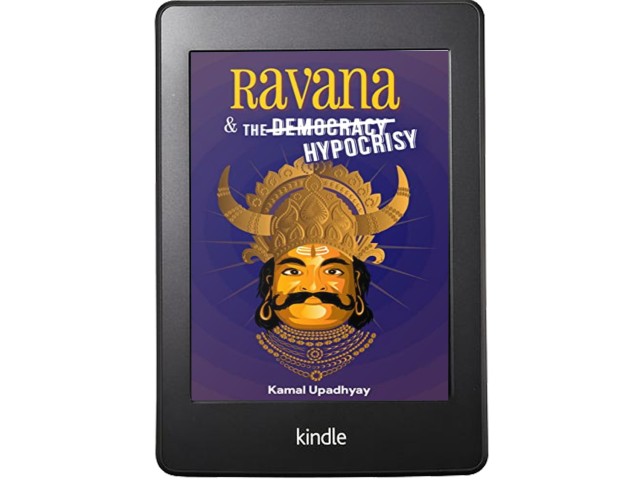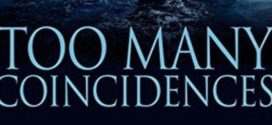Do you love reading books?
We do.
If you enjoy reading satires and can digest the punches on the political system, social canvas, human behavior and the psyche of people; without getting offended, then this book review is for you. Sometimes our notions don’t allow us to see the things from a third person’s perspective and we may get annoyed by satirical depiction of many things.
Actually, our society is indebted to various satirists around the who never shied away from calling a spade “a spade”. They kept, people in power on their toes, and thus make them work for the greater good of the society.
The book we are going to talk about today – Ravana & The (Democracy) Hypocrisy – is neither trying to offend any one or any specific system, it is a satirical take on our system and society as we had seen in last few decades and beyond.
Kamal Upadhyay, an author from Mumbai, India, explores various genre when writing short eBooks. Here is a small list of some of his books we got a chance to read and share our views about. As far as I can recall, his first published book was in English – The Journey of Eva. He writes mostly in Hindi.
- Ilu – A Hindi Short EBook By Kamal Upadhyay | Review
- Ilu : Chalnewali Chidiya (ईलू : चलनेवाली चिड़िया) by Kamal Upadhyay | Book Review
- Christmas Gift | An Emotional Short EBook By Kamal Upadhyay | Personal Review
| Book Title | : | Ravana & The Democracy |
| Author | : | Kamal Upadhyay |
| # of Pages | : | 60; 890 KB (Kindle EBook) |
| Purchase Link(s) | : |
However, for a change, he wrote his latest book in English. It is a loose adaptation of his Ravana-Loktantra series in Hindi.
- Lankapati Ka LokTantra (लंकापति का लोकतंत्र) | Book Review
- Ravan Aur LokTantra (रावण और लोकतंत्र) By Kamal Upadhyay | Book Review
This Is Here In For You
Book Cover:
Being a gateway to the virtual world explored within, the cover page serves the purpose of representing the book. And, if we like the same at the first glance, the chances are high that we go ahead and further elaborate it by reading the blurb and other details. Eventually, we may go ahead and read/purchase the book. That’s why, the book cover is a very important element for any book, despite it should not be the only factor to judge it.
Let us take a look at the cover page of – Ravana & The (Democracy) Hypocrisy.

Ravana & The Democracy By Kamal Upadhyay | Book Cover
By knowing the authoritarian nature of Ravana, we know that his implementation of Democracy could not be more than a Hypocrisy, right? The designer, Mr. Chetan Adlak, has done a convincing job of representing this central theme of the book. The dark blue background reflects the time face by Ravana during his experiment with Democracy. Being the protagonist, an illustration of Ravana’s face occupies most part of the cover page, making it look appealing.
Overall a good cover page.
The Plot:
Let us take a bird’s eye view of the story.
Ravana, the wealthy king of Lanka, a prosperous nation is ambitious. And, when he see that the countries around the world are attracted towards having democracy implemented there. The authorities, kings and/or governments follows this wave of “people’s wish” and implements it at their level. Of course, the percentage of actual democratic environment in that respective country is strictly based on the government/ruler.
These days the fever of getting the “Nobel Peace Prize” is high amongst the leaders of those respective administrative bodies. The leader who got “Nobel Peace Prize” is seen as a noble and remarkable figure around the world. Ravana was also human and was tempted by the thought of earning the same.
And, as the first step of the same, he decided to declare Lanka as a democracy and holds elections there for the people. Naturally, he was elected as the ruler by the people.
His “love-affair with democracy” doesn’t last long as he started experiencing the power of media and people’s perceptions and their importance in democracy. He can’t be seen in public when he is drunk, he/his family members cannot be seen in compromized situations in public, their access to the treasury and wealth is limited,… the list goes on and on.
And, if that is not all, the people he considered his near and dear ones, who can never thought of raising an eye, when he was the king, are started conspiring to get to the throne!
What is going on in Lanka? How these things are unfolding?
Well, you need to read the book to get your answers. And in your journey you will meet with Ravana, Vibhishana, Meghnath, Mandodari, Uncle Maricha, Trijata, Vikat, Sulochana, Prahasta, and others.
Views And Reviews:
Having read Author Kamal Upadhyay’s Hindi books in Ravana-Democracy series, I was looking forward to read it and see whether it is just the translation of the original book(s) in English or the author has added some new elements as well! And, I found the book is just a loose adaptation of the respective Hindi books. It has its own new elements and the actual incidents happened in the recent past, also adapted in the series.
As said earlier, the title of the book sets the tone of the book quite effectively and you come to know that some hard hitting lines will be there. The author doesn’t forget to honey-deep them where felt so.
The author is good at elaborating characters and depicting their moods and habits. In the initial segment itself, we found lines like:
Ravana was relishing whiskey and dancing in an upscale club, where the booming sound of the song “old habits die hard” filled the air. The DJ was playing it loud, and Ravana’s love for the tune was evident from the way he danced.
And, his attitude as:
“Ravana’s steps are not so weak that he should pass all his burden on others like other leaders do in democracy,”…
Through the following lines uttered by Ravana, the author not only points out to his basic vision behind declaring democracy in Lanka, but also elaborates how geopolitics works. When one country is seen as a potential market, it was promoted by pampering it in some areas. This is really trues. And, we can definitely remember various beauty contents, their winners, and how multinational companies and costly beauty products has made their way in bigger countries like India.
“Vibhishana told me that if Lanka were declared a democracy, I would get the Nobel Peace Prize. But what’s the point? Westerners only give prizes to people of Asia when they want to sell their products here. …
And here is another dig on beauty products:
“Dad, I take a milk and honey bath every Tuesday. It gives my skin all the necessary ingredients to maintain a glowing complexion,” Trijata explained. Vibhishana then showed Trijata an advertisement in the newspaper. After seeing the advertisement, Trijata burst out laughing and said, “Papa, you can’t get a bar of soap mixed with milk, cream, honey, and almonds for such a small amount of money.” Vibhishana also smiled at Trijata’s remark.
See, how beautifully this line has depicted Ravana’s attitude and also take a dig at various democratic leaders! Here is another such punchline.
“Uncle Maricha, my head is pounding. I think the bar served me some local liquor disguised as a foreign drink last night.” “Nephew, you know that bar doesn’t have a permit for a dance club.” “Uncle Maricha, I was there myself, what permit do we need? We are the ones who make the rules.”
The author also elaborates how bureaucracy functions in liberal democratic regime.
“Why tomorrow and not today? What is our Navy doing?” “I’m sorry, Ravana. The Navy Chief is on sick leave. He had twelve sick leaves pending this year, and according to HR policies, they cannot be encashed, so he insisted on taking leave. You know how it is with democracy. I had to allow it.”
The characters are stronger, regardless of gender.
Trijata glared at the man and retorted, “Thank Mahadev that Lanka is now a democracy where law- abiding citizens exist. Otherwise, my sword would have tasted your blood by now. And as for being a woman, I am more capable than you in every sense. If you wish, we can duel with swords.”
The book also refers some modern literature and the use of colloquial language.
“We shall meet in the place where there is no darkness.,” Maricha replied. “Uncle Maricha, don’t speak too typically. I have also read George Orwell books and can understand colloquial language,”
And yes, the family banter and domestic sit-com like stuff is also there.
“Don’t worry, Mom. I’m going to help Dad right now,” Meghnath said. Mandodari gave him a sarcastic look. “Has your wife given you permission to leave?” Meghnath looked at his mother with questioning eyes.
Really, interesting…! Here is another one.
“I don’t see any teachers either. I myself have signed the salary checks of the teachers of the literacy mission, and the number of students is present in my report. I have even inspected the schools built under the Literacy Mission,” Mandodari said. “Which school did you visit?” the maid asked. “The one near Palika Bazar,” Mandodari replied. “Oh my goodness, you are so naive,” the maid said. “There is no school near Palika Bazar. That elusive Martin Soursee puts up sets for his films, and that same set would have been shown to you as a school,” she explained. “Oh Lord Shiva, such a scam on top of a scam. It is difficult to help the public in a democracy,” Mandodari lamented.
—– —–
Uncle Maricha pleaded with Ravana, laying at his feet and asking for forgiveness, “Please forgive my nephew for all my mistakes. I had to do all these things to secure funding so that you could fight the election.”
And, if such things got a mention, why economy to be left behind?
“Okay, then let me tell you, if you see any future in her business, I am here to make an angel investment in her business,” Meghnath offered. “No, no, my friend is self- sufficient. She wants to run the whole business with her own bootstraps. Anyways investors are nothing but people with cheque and pen.” Sulochana declined the offer.
The book re-establishes the root idea behind democracy quite well.
in a democracy, if policies are used properly, more power can be enjoyed than in a monarchy, and its flag remains high in the eyes of the country and the world.
The book has some fantastic wisdom lines like:
good intentions alone are not sufficient for the people’s welfare.
If I had to choose only one quote from the book, I would settle for the following:
Difficult and easy depend on one’s skill.
Of course, it could have been written a little better (or may be a punctuation mark do the job).
Ravana’s son Maghnad (aka Indrajeet) is referred to as “Meghnath” in this book. It could have been taken care of.
The book has some typos/proofreading errors which could have been avoided. Eg:
“What?” Mam Maricha’s face was a big question mark.
—– —–
But Ravana ran towards another boat, which had a sticker saying, “Catch me if you can!”. Sailo told Ravana that this is not the right boat.
These quotes must have given you a fair idea about the book and its content.
Summary:
If you love satires, and can read with an open mind, you will enjoy reading this book.
ThinkerViews Rating:
Around 7.5 stars out of 10.
Quick Purchase Links:
- Buy - Ravana & The Democracy by Kamal Upadhyay - Kindle EBook - Amazon IN
- Buy - Ravana & The Democracy by Kamal Upadhyay - Kindle EBook - Amazon US
Over To You:
If you already have read the book do share your remarks and thoughts via comments below. Does this review help you in making your decision to buy or read the book? Do not forget to share this article with your friends over various social networks via Twitter, Facebook and others. And yes, you may like to subscribe to our RSS feeds and follow us on various Social networks to get latest updates for the site to land right in your mail box.
 ThinkerViews – Views And Reviews Personal views and reviews for books, magazines, tv serials, movies, websites, technical stuff and more.
ThinkerViews – Views And Reviews Personal views and reviews for books, magazines, tv serials, movies, websites, technical stuff and more.



